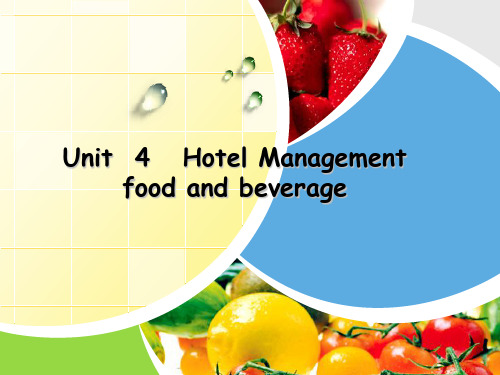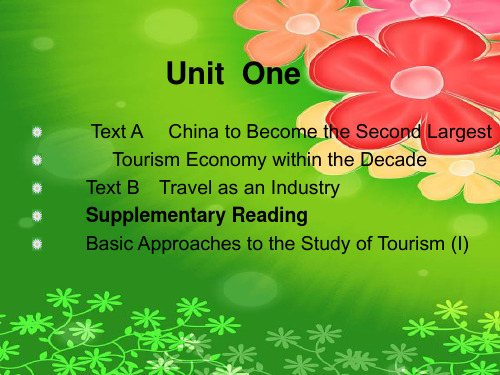旅游英语教程 修月祯主编 第01章
旅游英语修月祯Hotel Managementfood and beverage

• •
Part.2 Serving order
• At the restaurant , once you are settled in the seat, the first thing you usually order is aperitif [əˌperəˌti ːf]开胃酒.
Part.2 Serving order
•
Generally it contains a small amount of food with high quality.
deviled egg
soup
Soup can be broadly divided into the clear soup, cream soup, vegetable soup and cold soup.(清汤、 奶油汤、蔬菜汤和冷汤)
green salad
Main Course主菜
Dishes with meat and poultry(家禽) are the main course, among which the most representative is beef or steak. Others are pork, mutton, chicken , duck, goose or fish.
Foreigners are not expected to use chopsticks proficiently, but if they do, they will give a mighty impression. Therefore before you go to China, go to the local Chinese restaurant, if not to find authentic Chinese food, at least you can practice the use of chopsticks. If in your first meal in China you don’t have to use chopsticks, then if you still can’t handle the two sticks to pick up a big shrimp in your tenth meal, you show your incompetence in learning and the willingness to learn.
旅游专业英语教程unit 1

Phrases
Abbreviations
Notes
Notes
Text
请老师朗读并讲解课文
Exercises
请做课后练习
司爱侠其他部分著作
《计算机英语教程》,北京,人民邮电出版社:国家级十五规划教材 《电脑英语掌中宝》,南京,东南大学出版社:获“华东地区大学出版社教材专著二等奖” 《计算机专业英语教程》,北京,高等教育出版社 《电子商务专业英语教程》,北京,高等教育出版社 《计算机专业英语教程》,北京,机械工业出版社 《电脑英语词汇通》,北京,人民邮电出版社 《计算机实用英语》,西安,世界图书出版公司 《计算机专业英语教程》,北京,清华大学出版社 《电子商务专业英语教程》,北京,清华大学出版社 《信息管理专业英语教程》,北京,清华大学出版社 《电气工程专业英语教程》,北京,清华大学出版社 《电子商务专业英语实用教程》,杭州,浙江大学出版社 《计算机专业英语教程》,北京,科学出版社 《饭店酒店管理专业英语教程》,北京,清华大学出版社 《法律专业英语教程》,北京,清华大学出版社 《旅游专业英语教程》,北京,清华大学出版社 《大学英语听说新体验(带mp3光盘)》,杭州,浙江大学出版社 《大学英语学习指南》,北京,外语教学与研究出版社 《大学体验英语学与练》(丛书,四册),天津,南开大学出版社 《大学体验英语词汇通》,天津,南开大学出版社
旅游专业英语教程
Unit 1
Introduction to Tourism Industry
退出
Text A
Introduction to Tourism
退出
New Words
New Words
New Words
New Words
New Words
旅游英语第一讲ppt课件

Travel as circle
Return
Reach
Tourism as a
phenomenon
The other
Definition of tourism
Elements
The temporary movement of persons to destinations away from their usual or normal houses, the activities entered upon during their stay in those destinations and the facilities developed to provide for their requirements/needs.
English for Tourism
III. Focal points
Grading Scheme ➢Attendance and participation ➢ Assignments ➢ Final exam (oral or written)
➢What is tourism? ➢Why do people travel? ➢What is a travel agency?
English for Tourism
Tourism-related industries
Food industries
Food & Beverage: Not only provide basic sustenance for tourists but an important factor in the overall tourism experience. Transportation
通过对学生进行听力口语等英语听说技能的训练使学生能用所学英语开展实际业务工作进行酒店的前厅接待客房服务餐饮服务及旅游接待涉外导游提高学生的听力理解水平口语表达能力和对语言运用的分析理解能力
旅游专业英语(第四版)第一章教案 (2)[4页]
![旅游专业英语(第四版)第一章教案 (2)[4页]](https://img.taocdn.com/s3/m/3edb275526284b73f242336c1eb91a37f011324b.png)
Step 2: Situational dialogue
1)Teacher’s explanations about the vocabulary, short expressions and sentence structures
1.独立完成课前任务
2.小组合作完成情景对话角色扮演
3.用所学阅读语料的知识用英语向班级同学流利展示中国文化精髓并模拟导游工作场景设置英文问答等互动环节
了解机场服务(机舱内服务)英语技能、通晓中国饮食文化之英语表达
四、教学反思
不足
学生对机场工作场景不熟悉,缺乏真实的工作体验感。
改进策略
1.根据实际课时和学生学习实际情况,开发模拟导游实训室或实训基地,加强学生对岗位的认知和体验,让所学知识能活学活用。2.引导学生尽快适应高职英语学习模式。
处理方法
通过学习相关词汇和句型,帮助学生掌握此工作任务涉及到的口头和书面英语表达,然后通过角色扮演和演讲等活动巩固所学的内容。
二、教学策略
设计理念
教学方法与手段
教学评价
采用小组塔式多维度评价学生学习成效。破除了唯分数评价学生的传统评价模式。采用小组塔式式管理评价模式能更加客观、全面地评价学生的学习表现,提高学生参与课堂、小组活动的主动性和积极性。
《旅游专业英语》教案(1-3课时)
一、教学分析
授课信息
课程名称
旅游英语
授课对象
旅游管理、涉外旅游管理
教学章节名称
Chapter I Englishi at Airport
教学单元
Unit 3 On the Plane
第一章 unit 1 《新编旅游英语教程》 PPT课件

confine fare charter supply accessible location cruise excursion freighter ferry
v. n.
v. n.
adj. n. n.
n. n. v.
限制, 禁闭 费用, 旅客, 食物
租, 包(船、车等) 补给, 供给, 供应品
易接近的, 可到达的 位置, 场所, 特定区域 巡游, 巡航
Text B Travel as an Industry
Notes
Using smaller airplanes, air taxi companies fly passengers or supplies to destinations that may not be accessible to scheduled air carriers. 飞机出租公司用小型飞机把乘客或 货物运送到航空公司无法抵达的地方。 Oslo奥斯陆:是挪威首都和最大的城市。 1952年冬季奥林匹克运动会在此举行。
游览,短途旅行 货船 渡运, (乘渡船)渡过, 运送
Text B Travel as an Industry
riverboat
n.
内河船
underpinning n.
基础, 支柱, 支撑
rental
adj.
租用的
limousine
n.
豪华轿车
mass
adj.
大规模的, 集中的, 群众的
transit
Text A China to Become the Second
Largest Tourism Economy within the
Decade
Notes
旅游英语教程

旅游英语教程ﻩ错误!未定义书签。
第一课在机场In theAirport............................................................ 错误!未定义书签。
第二课入境英语On Arrivalﻩ错误!未定义书签。
第三课电话预定房间Hotel Reservationﻩ错误!未定义书签。
第四课问路和交通................................................................................ 错误!未定义书签。
第五课观光Sightseeing ............................................................ 错误!未定义书签。
第六课购物Shopping ............................................................................ 错误!未定义书签。
第七课用餐Dining............................................................................ 错误!未定义书签。
第八课回国Return toChina...................................................... 错误!未定义书签。
第一课在机场In the Airport需要帮忙吗?May Ihelp you?我要办理此次班机的登机手续。
I'dlike to check in for this flight, please.请把行李放在磅秤上。
Please put yourluggage onthis scale.你需要在柜台托运你的行李。
You need to claimyour baggage at the counter. 我可以把这件行李随身带到飞机上吗?Can I take this oneas carry-on baggage?班机准点吗?Is theplaneon schedule?可否给我靠窗的座位?/靠走道的座位?Could I getawindowseat?/an aisle seat?登机门是几号?Whatis the gate number?登机门怎么走?Whichway to the gate?你将在旧金山机场转机。
旅游英语教程参考答案
旅游英语教程参考答案Unit 1: Greetings and Introductions1. What is the most common way to greet someone in English? - The most common way to greet someone is by saying "Hello" or "Hi."2. How do you introduce yourself to someone?- You can introduce yourself by saying, "Hi, my name is [Your Name], nice to meet you."3. What are some polite phrases to use when meeting someone for the first time?- Some polite phrases include "Pleased to meet you," "It's a pleasure to meet you," and "I'm delighted to make your acquaintance."Unit 2: Making Travel Arrangements1. What is the process of booking a flight in English?- To book a flight, you would typically say, "I'd like to book a flight to [destination] on [date]."2. How do you inquire about the availability of a hotel room? - You can ask, "Do you have any rooms available for [date]?"3. What is the phrase used to confirm a reservation?- You would say, "I'd like to confirm my reservation for [service]."Unit 3: At the Airport1. What do you say when you need to check in for a flight?- You would say, "I'd like to check in for my flight to [destination]."2. How do you ask for directions to the gate?- You can ask, "Excuse me, could you please direct me to gate [number]?"3. What is the phrase used to request assistance with luggage? - You can say, "Could you help me with my luggage, please?"Unit 4: On the Plane1. How do you ask for a blanket or pillow?- You would ask, "Excuse me, could I get a blanket and a pillow, please?"2. What do you say if you need to use the restroom?- You can say, "Excuse me, where is the restroom, please?"3. How do you request a beverage or snack?- You would say, "Could I have a [beverage or snack], please?"Unit 5: At the Hotel1. What is the phrase used to check into a hotel?- You would say, "I have a reservation for [your name],I'd like to check in."2. How do you ask about the hotel's amenities?- You can ask, "What amenities does the hotel offer?"3. What do you say if you need to request extra towels?- You would say, "Could I get some extra towels, please?"Unit 6: Dining Out1. How do you ask for a table at a restaurant?- You would say, "Do you have a table for [number of people]?"2. What is the phrase used to request the menu?- You can ask, "May I see the menu, please?"3. How do you order a meal in English?- You would say, "I'd like to order [dish name], please."Unit 7: Sightseeing1. How do you ask for directions to a tourist attraction?- You can ask, "Could you tell me how to get to [attraction]?"2. What is the phrase used to buy a ticket for a tour?- You would say, "I'd like to buy a ticket for the [tour name]."3. How do you inquire about the operating hours of a museum? - You can ask, "What are the opening hours of the museum?"Unit 8: Shopping1. How do you ask for the price of an item?- You would ask, "How much does this cost?"2. What is the phrase used to negotiate a price?- You can say, "Could you give me a discount?"3. How do you ask for a receipt?- You would say, "May I have a receipt, please?"Unit 9: Emergency Situations1. How do you ask for help in an emergency?- You would say, "I need help, this is an emergency!"2. What is the phrase used to call for medical assistance? - You can say, "I need a doctor, please!"3. How do you report a lost item?- You would say, "I've lost my [item], can you help me find it?"Unit 10: Cultural Etiquette1. How do you show respect for local customs?- You can say, "I am here to learn about and respect your customs."2. What is the phrase used to apologize for a cultural mistake?- You can say, "I apologize。
《旅游英语》第一章Travel Arrangement
2 Task Description
8
I Task Description
Discussion: 1. As a tour guide , how would you begin your work when you get the reception program from the travel agency? Dou you know the full form of CITS?
program from the travel agency. Making tour arrangements as following:
The four-day travel in Shanxi.
2. Could you list the tourist sites mentioned in this passage?
Mount Wutaishan, Yungang Grottoes, the Pingyao Ancient City
9
Ⅱ Task Description
China International Travel Service
tour guide
coach
itinerary
10
Ⅱ Task Description As a tour guide, you begin your work when you get the reception
houses in northern China. From this tour, you will appreciate the beautiful landscape
in Shanxi. In _a_d__d_i_t_i_o_n__, you will get to know a little about Buddhism and its culture. You will also appreciate the classic folk houses, which may v__a_r_y_______ from those south of the Yangtze River, and u_n__d_e__r_s_t_a_n_dMerchant Culture of Shanxi, which exerted a great __in__f_lu__e_n__c_eon the Chinese modern history. So the four-day tour will give you a glimpse of many __a_s_p_e__c_t_s__ of Chinese culture.
旅游英语Unit+1+Tourism+and+Tour+Guides4
Professionalism
• represent not only your personal appearance and behavior but that of your company as well as your country. • depend on the way you dress yourself, your ability to use and understand languages, your manners and social skills and your attitude toward your work and the people you are providing services to. In general , your professionalism is your appropriate behavior when you are conducting a tour.
• A Teacher
• help inbound tourists learn and understand the history, culture, traditions and important ideas of your city as well as China.
• An Entertainer
• Jobs done by Tour Guides
• navigating, communicating, interpreting, rolemodeling appropriate behavior, entertaining, treating injury, ensuring safety, managing disasters etc.
• make yourself a humorous entertainer, not a stage actor but a friendly, active, high-spirited person to help your guests enjoy their travel.
《旅游英语》教学教案
任务知识点
教学实施
备
注
教
学
做
项目内容
学时
项目
内容
学时
项目内容
学时
导游实务
Know-how for Tour Guides
1. Sightseeing tempo
2. Introduction
for different tourists
0.5
把握游览节奏及讲解方法
——Travel in Shanghai
授课天数
3
项目任务
游客意外事故处理、景点讲解
学时数
6
重点难点
1.对游客行李丢失、火灾的处理措施
2.以外滩、南京路为例,运用解释法模拟导游讲解景点情景
任务知识点
教学实施
备
注
教
学
做
项目内容
学时
项目
内容
学时
项目内容
学时
导游实务
Know-how for Tour Guides
问答讲解法
0.5
以佛教名山—九华山为例,掌握旅游景点介绍讲解的问答法
0.5
要求学生扮演成导游,结合课文中用到的问答讲解方法对安徽一景点进行介绍
1
第六单元:
项目六
餐饮服务——江苏导游
Food and Beverages
——Travel in Jiangsu
授课天数
3
项目任务
就餐服务、景点讲解
学时数
6
重点难点
情景对话
Situational
Dialogues
The Terra Cotta Warriors and Horses
- 1、下载文档前请自行甄别文档内容的完整性,平台不提供额外的编辑、内容补充、找答案等附加服务。
- 2、"仅部分预览"的文档,不可在线预览部分如存在完整性等问题,可反馈申请退款(可完整预览的文档不适用该条件!)。
- 3、如文档侵犯您的权益,请联系客服反馈,我们会尽快为您处理(人工客服工作时间:9:00-18:30)。
Part II Reading
Text A
New Words & Expressions
acquisition n. motivation n. exploration n. emerge v. domesticate v. stabilize v. accommodation n. establishment n. retail n. hospitality n. temporary adj. destination n. undertake v. 获得 动机 探险,探索 出现,形成 驯养 稳定 住宿 公司,企业 零售 殷勤好客 暂时的,临时的 目的地 承担
清华版· 等院校旅游与饭店管理专业规划教材
旅游英语教程
修月祯 主 编
Unit 1
Tourism Industry and Tourists
Part I Listening and Speaking
Passage 1
New Words & Expressions Chinese Lunar New Year reservation n. analyst n. appreciation n. venture v. outbound adj. China’s Exit-Entry Bureau inbound adj. year-on-year 中国农历新年 预订 分析家 增值;欣赏 冒险,敢于 开往外地的,出境的 中国出入境管理局 入境的 同比
favorite adj.
n. 喜欢的人(或物)
A teacher shouldn’t have favorites in the class. 教师在班里不应该偏爱某些学生。
Dialog
New Words & Expressions the Lantern Festival the Tomb-Sweeping Day the Dragon Boat Festival the Mid-Autumn Festival scrap v. adjacent adj. netizen n. deprive v. entitle vt. heritage n. revise v. revision n. 元宵节 清明节 端午节 中秋节 废弃 邻近的 网民 夺去 给……权利 遗产 修订 修订
remain v. 保持,留下
far from 远离(某地) 远不是
entitle v. 给…… 题名,给予……权利
be entitled to do sth. 被赋予……权利 be entitled to sth. 被赋予……权利
Notes
(1) adjacent to 邻近的 (2) in a row 连续 (3) …deprives people working far from their hometowns of the chance to go back home for family gathering. deprives sb. of sth. 剥夺某人 做某事的权利
Tourism
Since the beginning of time humans have traveled. Food, water, safety or acquisition of resources (trade) were the early travel motivations. But the idea of travel for pleasure or exploration soon emerged. Travel has always depended upon technology to provide the means or mode of travel(1). The earliest travelers walked or rode domesticated animals. The invention of the wheel and the sail provided new modes of transportation. Each improvement in technology increased individuals’ opportunities to travel. As roads were improved and governments stabilized, interest in travel increased for education, sightseeing, and religious purposes. Tourism is a collection of activities, services and industries that delivers a travel experience, including transportation, accommodations, eating and drinking establishments, retail shops, entertainment businesses, activity facilities and other hospitality services provided for individuals or groups traveling away from home. Mathieson and Wall (1982)(2) created a good working definition of tourism as “the temporary movement of people to destinations outside their normal places of work and residence, the activities undertaken during their stay in those destinations, and the facilities created to cater to(3) their needs.”
The Spring Festival remains a three-day public holiday. 春节还是三天假。 The remains of the meal are[is] in the refrigerator. 剩饭在冰箱里。 To pay respect to the remains of sb. 瞻仰遗容 people working far from their hometowns 远离家乡工作的人 The show was far from being a failure; it was a great success. 这个表演不仅没有失败,而且是很成功的。 He entitled the book “ Spring Days”. 他把书题名为《春天的日子》。 All employees of government agencies, enterprises and public-service institutions were entitled to take paid holidays. 政府机构、企业和事业单位的所有职工都享有带薪休假的权 利。 Every child in China is entitled to compulsory education at school. 在中国,每一个孩子都有接受义务教育的权利。
Passage 2
New Words & Expressions stereotypical adj. consecutive adj. domicile n. domestic tourism inbound tourism outbound tourism internal tourism national tourism 陈规的,典型的 连续的 住宅,家 国内旅游(一国居民在本国内旅游) 入境旅游 出境旅游 境内旅游(国内旅游加上入境旅游) 国家旅游(国内旅游加上出境旅游)
According to Macintosh and Goeldner (1986)(4) tourism is “the sum of the phenomena and relationships arising from(5) the interaction of tourists, business suppliers, host(6) governments and host communities in the process of attracting and hosting these tourists and other visitors.” Any attempt to define tourism and to describe its scope fully must consider the various groups that participate in and are affected by this industry. Their perspectives are vital to the development of a comprehensive definition. Four different perspectives of tourism can be identified: 1. The tourist. The tourist seeks various psychic and physical experiences and satisfactions. The nature of these will largely determine the destinations chosen and the activities enjoyed. (7) 2. The businesses providing tourist goods and services. Business people see tourism as an opportunity to make a profit(8) by supplying the goods and services that the tourist market demands. 3. The government of the host community or area. Politicians view tourism as a wealth factor in the economy of their jurisdictions. Their perspective is related to the incomes their citizens can earn from this business. Politicians also consider the foreign exchange receipts from international tourism as well as the tax receipts collected from tourist expenditures, either directly or indirectly.
